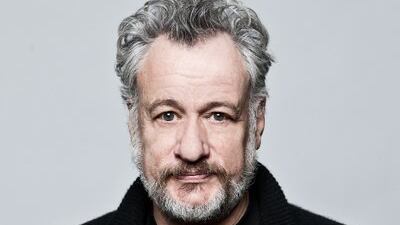Growing up obsessed with Star Trek: The Next Generation, composer Nicholas DiBerardino never imagined he would tour with one of the show’s most beloved stars. But on March 14, he and actor John de Lancie (who played the all-powerful prankster “Q”) will be at the Alberta Rose Theatre for a concert that celebrates the past and future of classical music.
Presented by Chamber Music Northwest and featuring students and alumni from the Curtis Institute of Music in Philadelphia, the evening’s centerpiece is a performance of Igor Stravinsky’s musical fable L’Histoire du Soldat (The Soldier’s Tale), narrated by the inimitable de Lancie (whose ebullient delivery of lines like “Mon Capitaine!” has made him a god to Trekkers).
The concert will also showcase other works, including a piece by DiBerardino inspired by the classic Next Gen episode “Darmok,” in which Capt. Picard (Patrick Stewart) struggles to communicate with aliens who speak solely in metaphors. It’s one of the most intellectually ambitious hours of television ever produced—and DiBerardino was determined to musically distill its philosophical richness.
WW spoke to de Lancie and DiBerardino about joining forces for a program that promises to delight aficionados of classical music and Star Trek alike.
WW: What role did music play in your childhood?
John de Lancie: My father, oboist John de Lancie Sr., taught at Curtis, ultimately ending up being the director of Curtis for eight or 10 years. I went to so many concerts at the Academy of Music. It was a way to listen to music—but, closer to the vest, it was a way to be with my dad, who wasn’t around very much. I listened to the music, I got to talk to some people—the stagehands were really nice to me—and I would go across the street, get myself something to eat, some candy.
With A Soldier’s Tale, Stravinsky brought so many influences together, including jazz. As a narrator, I can’t imagine how you bring all that together.
The Soldier’s Tale was originally intended for something very different from what you’re going to see. It was not originally a one-man show—you had at least three or four actors/dancers onstage. I told some of my friends who know the piece, and they said, “Oh, are you playing the devil?” “Well, yes, and also the soldier and also the old lady and also the wife.”
The texture of your voice is always so melodic and wonderful to listen to. How do you get the sound that many of us consider iconic?
When I went to Juilliard, we all had to audition on the first day, and the voice teacher said to me, “Your voice is so bad that I’m not sure if there’s anything I can do.” And at the end of my time there, she said, “You’ve taken nothing that I’ve given you.” And I said, “Well, you know, Liz, you told me there was nothing you were going to help me with, so I took you at your word.”
Unlike some people who I’m not going to mention in the Star Trek world who have fake voices, I’ve never done anything like that. You know if your voice is working properly when you put it under an enormous amount of stress. I guess what I’m doing is fine.
How old were you when you first saw “Darmok”?
Nicholas DiBerardino: I was watching Star Trek: The Next Generation in syndication in middle school. That show captures the majesty of what it means to understand someone, what it means to be a scholar or a diplomat—these very esoteric or even elevated ways of being a person. As someone who loves teaching, all that’s in there.
How do you make the leap from loving that world to creating something inspired by it?
I kept thinking about “Darmok” because of this idea of communication and grammar—that idea of speaking in metaphor. Because you can almost understand what the aliens are saying. But you can’t quite get there. That feeling was really interesting to me, and it felt like it was closely connected to the feelings I was interested in exploring musically.
When you’re writing a piece about the struggle to communicate, are the instruments in conversation?
There are moments in my piece where certain factions or groups are having a similar thought and then they’re rudely interrupted by someone else. It’s basically three duets: You have two string players, two brass players. and two wind players, plus this percussionist who’s back there.
By the end of the piece, do you have to bring it all together to underscore the core idea of finally learning how to speak an alien language?
At the end of the piece, everything finally comes together in the sense that all the instruments are playing together harmoniously. Whereas before, these kinds of atomic musical materials were the music. When everyone finds each other—when this music finds its voice or we find a way to hear it—then we actually do have the emergence of something like a melody, without us having to make any effort.
SEE IT: Curtis on Tour: The Soldier’s Tale with John de Lancie will be performed at the Alberta Rose Theatre, 3000 NE Alberta St., 503-719-6055, albertarosetheatre.com. 7:30 pm Tuesday, March 14. $10-$67.
